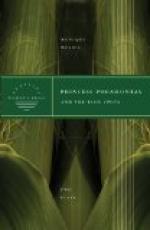“Make friends as soon as thou canst with the copper men, Captain,” whispered Robinson, “for I be main hungry and can scarce wait till thou hast bartered this rubbish ’gainst good victuals.”
“Pull thy belt in a bit tighter, men,” suggested the Captain grimly; “if I understand all they tell me, the Indians can beat the most devout Christians in fasting. ’Tis one virtue we may learn from them.”
They kept in the middle of the stream to be safe from any arrows that might be shot at them from shore; but after many hours of this caution. Smith determined to explore a little on land. To his practiced eye a certain little inlet seemed so suitable a landing for canoes that he felt sure an Indian village could not be far off.
“Push out into the stream again,” he commanded as he stepped ashore, “and wait for me there.”
John Smith strode into the forest, ready for friendship or war, since he knew not the temper of the natives of that region. Suddenly, as he came out upon an open space where a morass stretched from a hill to the river, two hundred shrieking savages rushed upon him, shooting their arrows wildly at all angles.
“War then!” cried Smith aloud, and as one young brave in advance of the others stopped to take aim, he leaped forward and caught him. Ripping off his own belt. Smith bound the astonished Indian to his left arm so that he could use him as a living buckler. Thus protected, he fired his pistol and the ball, entering the breast of an older chief, killed him instantly. For a moment the strange fate which had overtaken their leader checked the onslaught, while his companions stooped down, one behind the other, to examine the wound made by the demon weapon. This respite gave Smith time to whip out his sword, and whirling it about him, he kept his enemies at a distance. He might have succeeded in defending himself thus for some time longer, for the savages had ceased to shoot, not certain whether their arrows would not be ineffectual upon an invulnerable body, but all at once he became aware of a new danger. The marshy ground on which he stood had softened with his weight and that of his living shield and he now felt himself sinking deeper and deeper into the morass until he was submerged up to his waist. Still the Indians, doubtless fearing he had some other strange weapons or evil medicines in his power, did not rush forward to attack him.
The day was bitterly cold, and the stagnant water struck a chill to his very bones. His teeth began to chatter with cold, not fright. It was almost with a sense of relief that he saw the Indians start towards him. Carefully treading in their light moccasined feet, they gradually surrounded him and two, taking hold of him, while others loosened the bound brave, they drew him up from the slushy earth by the arms.
He was now a captive, and not for the first time in his life. There was nothing to be gained, he knew, by struggling, and he faced them with no sign of fear. They led him to a fire which was blazing not far off on firmer ground where sat a chief, who, he learned, was the werowance Opechanchanough.




